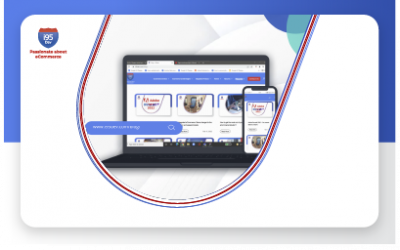Businesses worldwide are looking to deliver connected experiences, which is a major goal of Digital Transformation. The last decade primarily made use of cloud integration solutions, amongst which we are very likely to see a rise in hybrid integration during 2020 and after that.
On the older eCommerce platforms, the same server that hosts the retail site would be used to accommodate the software that runs the shopping cart. This certainly seemed logical before the cloud integration platform’s advent, but not anymore, especially when the data is a lot more scattered.
The need for a cloud integration platform
An average small to mid-size business is likely to have at least 13 or more different applications in its stack, with most of them not integrating. This puts customer data into watertight compartments, making it difficult to track the customer’s buying journey and touchpoints. What you need is an efficient system to manage customer data, automate business processes, and bring company software systems onto one interface, which is the cloud integration platform. This helps in streamlining eCommerce for both companies and customers.
How the CEO views trends in cloud integration solutions for eCommerce
The top management of every company has come to accept that the world’s economic climate is pretty uncertain. A CEO faces a lot of pressure when unable to showcase profits from revenue centers such as eCommerce, and that is when he or she needs to ask tough questions, some of which can be answered by cloud integrations. In terms of eCommerce and company performance, a CEO primarily looks in two directions:
- Global growth– Retail markets around the world are saturated at present. Since competition is fierce, most retailers are trying to acquire other firms to grow.
- Cloud-based integrations are necessary to integrate systems of different companies quickly and get up to speed on the competition, and possibly create new business models.
- Expectations from consumers– The most common disconnect between a company’s products and its customer’s expectations arises as a result of the company not being able to satisfy the end user’s requirements. Thus, it becomes difficult for the same consumer to display brand loyalty, and that’s when he or she shifts to a different brand. If a customer is not satisfied by a brand experience, they will not come back, which is a problem that can be fixed by a hybrid cloud integration platform.
Market trends on cloud-based integrations
- The emergence of hybrid integration platforms allows on-premise software to easily and securely integrate with cloud-based applications. They are meant to fuse the platforms of existing company systems through cloud integration tools, to pull out data easily. This helps to develop business strategies more effectively.
- Real-Time Enterprise Application Data- Enterprise Application Integration (EAI) platforms enable organizations to break down silos and make better forecasts through real-time data share. EAI is able to lend scalability to a company and brings about automation in integration. It makes operations more agile than before.
- Secure B2B integration- For Electronic Data Interchange (EDI) to occur as per industry standards, businesses require a B2B integration solution that offers compliance, security, and governance. Disparate data resources are integrated here for making business transactions easy.
- Connected customer experiences- Seamless shopping experiences where all consumer product expectations are met can only be made possible through eCommerce integrations. This is made possible when the retailer ties up with a cloud integration company.
- Integration with ERP and analytics- Even though CRM systems are being integrated with ERP and Analytics, there still are gaps in the same. These gaps will soon be fixed by iPaaS.
- Chatbots on Mobile- Chatbots are being widely used after eCommerce integrations. Through integration middleware, businesses can now integrate them with the company’s mobile apps. The bots completely depend on written and spoken messages.
How iPaaS is helping eCommerce
This is where you will get to see where the rubber meets the road, at least in terms of eCommerce. It is safe to say that at least 90 percent of eCommerce companies will definitely use one of the cloud integrations available in the market within the upcoming 5 years. Most eCommerce merchants are making use of IPaaS (Integration Platform as a Service) or IaaS (Infrastructure as a Service). A large number of eCommerce business owners use licensed carts to pay for hosting services. IPaaS is suitable for the smaller eCommerce companies which act as integration partners.
iPaas ensures that integration flows are built and deployed between the cloud’s enterprise and the cloud itself through cloud integration tools. In other words, no middleware or hardware installations are necessary before the purchase, sale, or exchange between users and the integration providers. Once the rules have been put into place, iPaaS is recognized as the primary ecosystem to view, modify, and manage operations, data, and infrastructure.
iPaaS provides connectivity to SaaS (Software as a Service) with the help of a secure method to access on-premises applications behind firewalls. Businesses can find a way to integrate cloud service applications with other on-premises enterprise applications such as ERP within a hybrid integration model. You can use an iPaas in the following 4 ways:
- Data transformation– Data is present across a variety of locations and formats and needs to be transformed into a usable form, which means it needs to be available from one database to another or from one application to another. Known as data transformation, iPaaS can harness this easily.
- Microservices integration– Microservices are corporate applications broken down into small and independent services for meeting a business goal. No dependencies are required in a microservice so that features can be added or deleted easily without redesign.
- Automatic API generation– APIs are the linking tools to integrate data in different applications with each other. Collecting APIs in the traditional fashion is quite tedious, but iPaaS makes it simple.
- Business process automation– App integration and software are needed to automate the workflow within an organization, which comes under Business Process Automation (BPA). Daily processes become more effective via iPaas solution.
i95Dev Cloud integrator is an efficient and robust cloud integration platform. Integrate your eStore platform with leading ERP applications seamlessly under one platform and automate your critical eCommerce business processes. For more info, speak to our integration specialist today.
Recent Blogs
22 Benefits of eCommerce for Home Décor and Furniture Businesses
22 Benefits of eCommerce for Home Décor and Furniture Businesses Author Category Share This blog was first published on MSDynamicsWorld. Home décor and furniture businesses are increasingly...
Home Improvement Industry: 11 Key eCommerce Features Consider
Elevating Home Improvement eCommerce: 11 Must-Have Features for a Seamless Shopping Experience Author Category Share In the dynamic landscape of home improvement, furniture, and lifestyle,...
Complete Guide to Automotive eCommerce Growth, Trends, Challenges, Solutions
A Comprehensive Guide to Accelerate Your Automotive Business Growth with eCommerce Author Category Share Introduction The automotive industry has undergone a significant transformation in...






